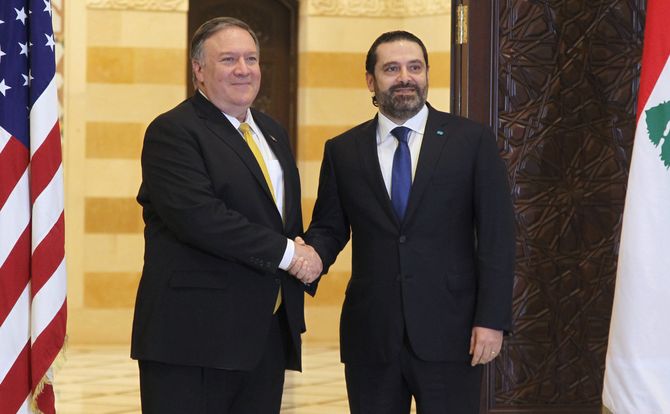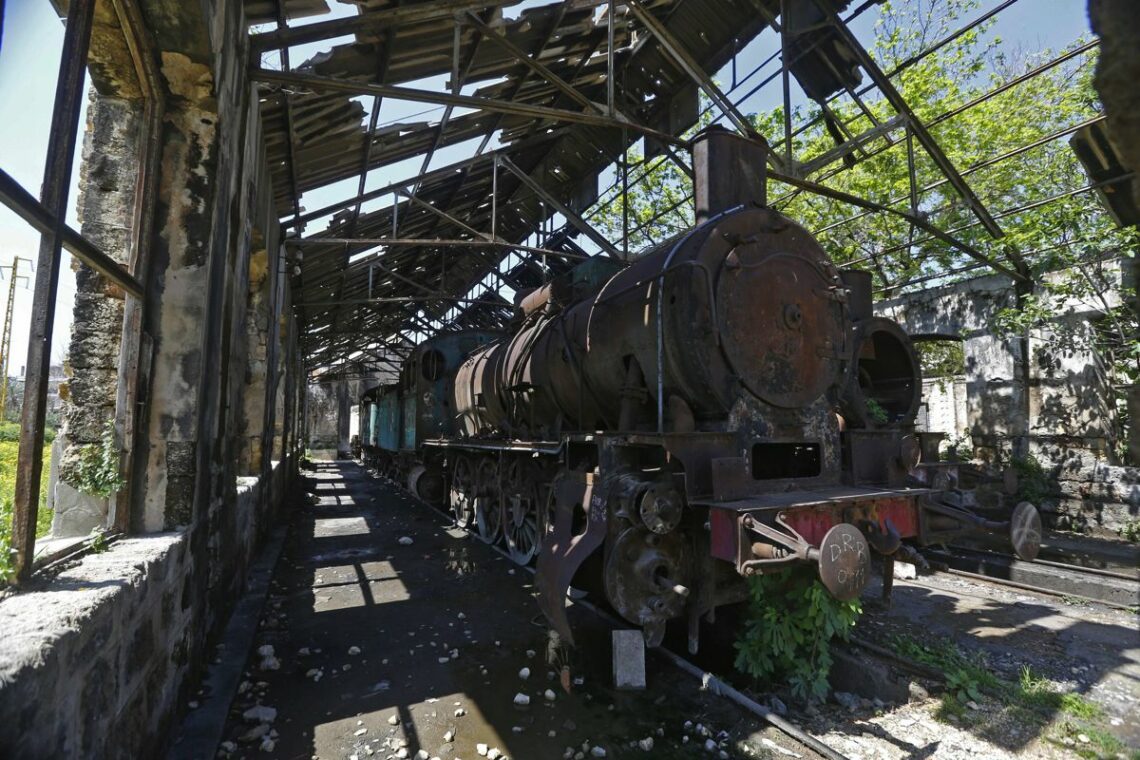Lebanon’s economy: still stuck
One year ago, French President Emmanuel Macron got officials and investors from 50 countries to agree on an $11.1 billion reform and investment program for Lebanon. After 12 months, with no signs of progress on the structural problems – corruption and 2 million refugees – the only recourse for young Lebanese may be to get out.

In a nutshell
- A year ago, Lebanon was offered $11 billion in infrastructure loans if it began reforms
- Progress since has been all but stymied by corruption and Hezbollah’s influence
- If nothing changes, the country appears headed for default and mass emigration
Almost exactly a year ago, French President Emmanuel Macron hosted ministers and investors from 50 countries at an international conference in Paris to support development and reform in Lebanon. Donors at the CEDRE meeting (a French acronym for “Economic Conference for Development through Reforms with the Private Sector”) agreed to extend $11.1 billion in loans and grants to fund a six-year Capital Investment Program (CIP) submitted by the Lebanese government. Financial support for this program, which won a positive assessment from the World Bank, was made contingent on tangible improvements in electricity supply, waste and water management, and public transport.
At the time, Lebanon watchers were skeptical, with some wondering how anyone could expect the funds not to be embezzled in a country that had been vainly promising to turn the power back on for 30 years. Perhaps for this reason, the program was based on three interlocking efforts: 1) a cleanup of public finances; 2) improvements in basic public services; and 3) renewed efforts to fight corruption.
The challenge was made even more daunting, as Lebanese Prime Minister Saad al-Hariri pointed out at CEDRE, by the presence of up to 2 million refugees fleeing the civil war in neighboring Syria – an unprecedented concentration in a country with only 4 million citizens. Besides imposing a crushing financial and social burden on the Lebanese state, the Syrian civil war has also devastated the Lebanese economy, halving its export trade between 2010 and 2018 by cutting off overland transport to markets in Iraq, Jordan, Kuwait, Saudi Arabia and the Gulf states.
Ugly numbers
Fast forward 12 months, and Lebanon remains a shambles. In March 2019, special ambassador Pierre Duquesne, dispatched by President Macron to review progress on the grant and loan program, declared that the Lebanese government must show “positive signs” of reforms. The indicators are far from encouraging.
According to the International Monetary Fund, Lebanon is the world’s third-most indebted country (behind Japan and Greece), with total government debt estimated at 161 percent of gross domestic product. Its annual budget deficit has hit 11 percent of GDP, and the IMF projects it to widen to 13 percent by 2023. Electricity subsidies alone account for 40 percent of the fiscal shortfall.
Meanwhile, economic growth plunged from 8 percent in 2010 to 1 percent in 2018, according to the World Bank. The rate of inflation has increased from 1.5 percent in 2017 to 7 percent in 2018, according to the Ministry of Finance and local economists (no reliable official statistics have been published since 2007). Unemployment is estimated at 37 percent, while 30 percent of the population lives below the poverty line.
A French historian said, ‘If you have understood something about Lebanon, then it was incorrectly explained’.
These dismal figures prompted Moody’s to cut Lebanon’s sovereign credit rating by seven steps to junk status in January 2019, and both Fitch (in December 2018) and Standard and Poor’s (in March 2019) switched the country’s outlook from stable to negative. S&P said the absence of significant fiscal reforms in Lebanon will further erode investor confidence. There are increasing jitters about the country’s ability to service its foreign debt, as shown by rising prices of credit default swaps, and even concern about the central bank’s ability to defend the dollar peg of the Lebanese pound.
Just how far Lebanon has fallen is illustrated by the standard of living, which back in 1975 was on par with several current members of the eurozone, including Ireland, Spain and Portugal. Since then, the country has only managed to shore up its balance of payments thanks to remittances from Lebanese living abroad.
The French historian Henry Laurens once remarked, “If you have understood something about Lebanon, then it was incorrectly explained.” Even so, there appear to be three millstones weighing on Lebanon and its economy.
The first is the country’s dysfunctional political system, which breeds corruption and a total lack of public confidence in its leadership. The second is security (or lack thereof), without which there can be no stability or sustainable economic growth. The third factor is the colossal burden of Syrian refugees.
Political impasse
For almost a decade, from 2009 until May 2018, Lebanon failed to hold a parliamentary election. Instead, legislators shamelessly self-extended their mandate twice, stripping parliament of the last shreds of its credibility. The country also went more than two years without a president, before parliament finally elected Michel Aoun, a former general, veteran Christian politician and Hezbollah ally, in October 2016.
When Lebanon did hold a general election last year, it was according to a new electoral law imposed by Hezbollah and its political allies. Appropriately, the results were first announced by Ali Akbar Velayati, the senior foreign policy advisor to Iranian Supreme Leader Ayatollah Ali Khamenei. They gave Hezbollah and its allies 76 out of 128 seats in the chamber. Mr. Velayati’s gesture showed clearly who are the real rulers of Lebanon.
Lebanon is probably the only country where Christians and Islamic radicals routinely team up in the same cabinet.
Nine months of tortuous negotiations were required before a new government was formed at the end of January 2019. Lebanon is probably the only country in the world where visceral opponents (Christians and Islamic radicals, for instance) routinely team up in the same cabinet. Not surprisingly, the public has little faith that politicians can put aside their differences to agree on a sensible distribution of public money. Without hope or trust in the national leadership, more than one in every 100 Lebanese – 68,000 people – emigrated from the country last year.
Self-inflicted wounds
A very clear example of corruption surrounds electricity. For more than 30 years, the Ministry of Electricity has failed to provide enough power, forcing households and small businesses to endure blackouts for more than 12 hours a day. Countries such as France, Germany and Russia, along with engineering giants such as Siemens, have made offers to build power plants that would cover Lebanon’s forecasted needs for the next 20 years, for a total cost of about $3 billion – payable via a 30-year loan.
Yet the responsible minister prefers to rent floating generators from Turkey to provide a fraction of that output, prolonging a power shortage that is costing the country about $2 billion a year and is one of the main contributors to the yawning fiscal deficit. In terms of service, Lebanon’s electricity system is the world’s fourth-worst, after Haiti, Nigeria and Yemen.

Another example is the $617 million project – mostly financed by the World Bank – to build a dam on the Bisri River. The dam is meant to provide badly needed water to 1.6 million Lebanese but is built over a second-degree seismic fault. There is concern that seepage could spur seismic activity and destroy the area’s remaining biodiversity, much as Lebanon’s other major dam, along the Litani River, has helped make that body of water the country’s most polluted – fouled by fertilizer and pesticide runoff, heavy metals and bilharzia.
A third self-inflicted environmental disaster is the garbage piling up in the streets of Lebanese cities, resulting from the local authorities’ failure to organize new landfills and disposal facilities. The waste and chemical effluvia have helped drive cancer rates to the highest in the Middle East, and yet nothing has been done to solve the problem of garbage collection.
Corruption fight
Last year, Lebanon made small strides in fighting corruption, but still ranked among the 50 most corrupt countries in the world (138th out of 180) in Transparency International’s Corruption Perceptions Index. The country has established a Ministry for Combating Corruption, but in its two years of existence it has yet to arrest anybody. Graft can be found almost everywhere – in electricity, telecommunications, justice, finance, health, waste disposal, construction, roads, water, sewage, ports, customs and even education. Journalists who attempt to expose corrupt officials have faced legal prosecution or gag orders.
For the first cabinet meeting after the government was formed on January 31, a vote on the 2019 budget had been scheduled. Instead, ministers voted to promote 2,000 teachers – an item that had not been on the agenda – based on undisclosed reasons and criteria. It was one more instance of featherbedding in Lebanon’s bloated public sector, which employs 200,000 civil servants, many of whom do little or no work. A blatant example is the state railway system, which is still staffed but has not provided regular passenger and freight service since the mid-1990s.
Offshore oil and gas was supposed to save Lebanon’s public finances; unfortunately, there will be no miracle.
One of the main conditions set by CEDRE for its $11 billion investment credit was a cleanup and reform of public finances. That part of the program has gotten off to a rocky start. Last month, the longtime general director of the Lebanese Finance Ministry, Alain Bifani, said that his superiors in previous governments had tried to block or obstruct audits of public accounts.
The savior of Lebanon’s battered public finances was supposed to be the discovery of vast offshore oil and gas reserves. Unfortunately, there will be no miracle, for two reasons. First, two of the most promising Lebanese blocks are in disputed territory directly adjacent to Israeli offshore fields. With the two countries still haggling over their maritime boundary, no company is willing to start drilling. The United States has entrusted Acting Assistant Secretary of State David Satterfield with a mediation mission, but nothing has yet been finalized.
The second reason is the nature of the licensing contracts reached between Lebanon and three foreign oil and gas companies – Total of France, Eni of Italy and Novatek of Russia. All were signed without an obligatory call for tender, and no exploratory drilling is expected to take place before the end of this year. Experts say the Novatek bid was accepted primarily for political reasons, as a nod to Russia’s increasingly important role in the Middle East. Lebanese estimates of up to 25 trillion cubic feet of potential gas reserves (based on seismic studies) need to be confirmed by drilling. There is not yet a clear strategy for exporting any oil and gas that might be found, as Lebanon is not part of the Aphrodite pipeline consortium involving Egypt, Israel and Cyprus.
Hezbollah’s grip
The second drag on the economy is the security situation. While all parties abhor the thought of another civil war, it has become clear that Hezbollah no longer constitutes “a state within a state” but has become the master of the country. The organization has tightened its control over customs, ports, the international airport and the judicial system. It commands an army of 50,000 fighters and an arsenal of more than 100,000 rockets and missiles. While it has sustained heavy losses in Syria, Hezbollah has also acquired confidence and combat experience. As a spokesman for one opposition party recently remarked, “how can you negotiate with a pistol at your head?”
The U.S. and the United Kingdom consider Hezbollah a terrorist organization, and American financial sanctions against the group have harmed the Lebanese economy. How will these countries deal with a government that now includes Hezbollah cabinet ministers? Economic links with Iran are already tightening. Lebanon is now a customer of Iranian steel, which is much cheaper than the European product but of poorer quality. There are also plans to import Iranian-produced pharmaceuticals, even though Lebanon has several local drug makers manufacturing to Western standards.
The biggest threat to Lebanon is the looming possibility of a war between Hezbollah and Israel.
The biggest threat to Lebanon is the looming possibility of a war between Hezbollah and Israel. In that event, Hezbollah might succeed in inflicting damage on Israel, but Lebanon could be bombed flat. An Israeli commander warned that retaliatory strikes could set back Lebanon “by 70 years” – to which Lebanese wags responded: “Well, at least back then we had electricity.”
Tensions between Israel and Hezbollah spiked in December 2018 with the discovery of several tunnels dug by the organization into northern Israel. Officially, Lebanon felt obliged to defend Hezbollah, then had to reverse its position after receiving a full report from UN peacekeepers. With the Israeli Defense Forces already weighing the merits of a preemptive strike against Hezbollah targets in southern Lebanon, there is also the risk of a wider war with Iran, which could create even more devastation. After the 2006 war, Saudi Arabia and other Arab countries paid most of the bill to reconstruct Lebanon. With the country now under Iranian tutelage, this will not happen again.
A tense visit to Beirut by U.S. Secretary of State Mike Pompeo on March 22 did not help matters. With one eye on Israel, where Prime Minister Benjamin Netanyahu was battling for reelection despite pending indictments on bribery and corruption charges, Mr. Pompeo bluntly told his hosts that they needed to stand up to Hezbollah’s “criminality, terror, and threats.” The American side made it clear that it will not continue to fund the Lebanese army if weapons end up in Hezbollah hands, or support government programs (such as healthcare) that come under the purview of Hezbollah ministers. Investment in oil and gas exploration is also doubtful with Hezbollah in power. The U.S. position was stated plainly by Mr. Pompeo in February, at a conference on peace and security in the Middle East in Warsaw: “We want Lebanon to be unified and we want Iran out.”
Refugee burden
The third problem is the Syrian refugees. After the war in Syria started in March 2011, Lebanon saw an influx of more than 1 million refugees within two years. For a small country like Lebanon, this constituted a colossal burden. Providing the bare necessities of shelter, food, water, electricity, healthcare and education to so many people is an enormous challenge.
On many occasions, Lebanon has turned to international donors – especially the Arab countries – for financial help. But many promises of donations were not kept, and substantial portions of the aid that did arrive were siphoned off by corrupt officials. As a result, net of international assistance, the annual cost of refugees to the Lebanese economy is estimated at about $10 billion. The government has been encouraging refugees to return to Syria, but so far this has resulted in only a few hundred repatriations. Stories of the Syrian regime killing returning refugees have effectively deterred others from going back.
Remote chances
Given this baggage, what are Lebanon’s prospects for an economic recovery?
One source of optimism is the competence of several ministers in Mr. Hariri’s 30-member government, and above all, the appointment of four women to cabinet posts – a first in the history of Lebanon. The hopes of many are vested in them.
But much of the present leadership, along with their business partners, have stolen and continue to steal from the country. That situation will not change until serious measures are taken. The judicial system needs to be overhauled and staffed with honest judges and magistrates; government officials and members of parliament should be required to reveal their financial assets and sources of income; and a new economic model installed to encourage personal responsibility and weed out corruption.
The chances of such a reform package being introduced are remote. Even if it were, the corrupt elite would probably succeed in throttling it, as happened in Ukraine.
But if Lebanon stays on its present course, its political and financial credibility will erode. The prospects of receiving an investment boost from the CEDRE program will fade, priming the country for a possible slide into insolvency. That would leave the younger generation of Lebanese with a stark choice: poverty or emigration.








